Powering downpublished at 14:27 BST 27 April 2018
We're going to close our live coverage here but our main news story will keep you up to speed on the day's developments. For more background on a historic moment for Koreans, try
The leaders of North and South Korea have pledged that their countries will never fight another war
Kim Jong-un crossed into the South to meet his counterpart Moon Jae-in
The pair signed a joint statement agreeing to pursue "complete denuclearisation of the Korean peninsula"
The two men walked and talked together after their first formal meeting
Many analysts remain sceptical about the North's apparent enthusiasm for engagement
David Molloy, Ellis Palmer, Patrick Jackson, Anna Jones, Andreas Illmer, Gary Kitchener and Joel Gunter
We're going to close our live coverage here but our main news story will keep you up to speed on the day's developments. For more background on a historic moment for Koreans, try
Some stirring words from the North Korean leader, delivered at the summit banquet earlier:
"We bade farewell to the frozen relationship between North and South Korea, which was a nightmare, and we announced the beginning of a warm spring to the world."
Duyeon Kim, a regional expert from the Korean Peninsula Future Forum in Seoul, told the BBC the summit - and in particular the document signed by the two Korean leaders - clears the way for a meeting between Kim Jong-un and Donald Trump.
"The denuclearisation language in the text, the insertion of the word complete denuclearisation, that's actually a win for President Moon, because he can take that to Washington and that helps leave the space, the political space open for President Trump to have a summit with Kim Jong-un," she said.
But any apparent commitments by the North need to be viewed with caution, she added.
"The North's track record is poor on this. They've shown time and time again that they don't live up to their promises. They show that they renege on agreements, they show that they pull various tricks and manoeuvres to get out of agreements and continue to develop and advance their nuclear weapons programme. So, if the past is a guide, I'm not optimistic."
The new US Secretary of State, Mike Pompeo, met Mr Kim in Pyongyang earlier this month.
Allow X content?
This article contains content provided by X. We ask for your permission before anything is loaded, as they may be using cookies and other technologies. You may want to read X’s cookie policy, external and privacy policy, external before accepting. To view this content choose ‘accept and continue’.
In its comments on the summit, Russia's foreign ministry said it would continue to work on a "Russo-Chinese road map" for a peaceful settlement.
"We see it as a significant step by Seoul and Pyongyang towards national reconciliation and the establishment of strong relations, which are inherently valuable," it added.
Kim Jong-un has now crossed back into North Korean territory, completing his first meeting with a leader of South Korea and the first meeting between leaders of the nations for more than a decade.
An extraordinary scene as Mr Kim and Mr Moon wrap up their historic meeting: the two leaders are holding hands, beaming, as they watch pictures of their first greeting projected on to a wall to a soundtrack of uplifting pop music.
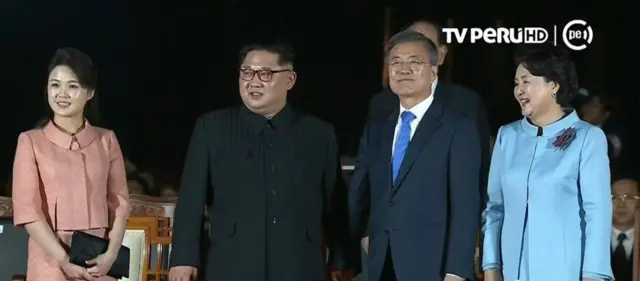 Image source, TVPeru
Image source, TVPeruA still from TV Peru shows the leaders holding hands at the closing ceremony
Friday’s meeting was the third Inter-Korean summit to be held between the leaders of North and South Korea.
The first, in 2000, did not set any time frames and had very broad commitments. But here are the main differences between the 2007 and 2018 agreements:
Peace
2007: Recognised need to end 1953 armistice and “establish a permanent peace regime”
2018: Declaration to end Korean War. Agreement to “actively pursue” meetings with either the US or the US and China
Economic Cooperation
2007: Outlined a number of economic initiatives, including opening freight rail services between Munsan and Bongdong, and finalising related issues such as customs clearance
2018: Implementing the 2007 projects
Military
2007: The two countries “agreed not to antagonize each other, reduce military tension and resolve issues in dispute through dialogue and negotiation”. Planned talks between defence ministers to establish military guarantees for the agreement
2018: Both countries “agreed to completely cease all hostile acts against each other in every domain, including land, air and sea”. Frequent meetings between military authorities
Peace zone
2007: Joint fishing zone
2018: Converting the demilitarised zone into a peace zone by completely ending propaganda broadcasts at the border. Practical measures to create the maritime peace zone/ joint fishing zone
Sport
2007: Joint cheering squad to 2008 Olympics
2018: Joint participation in international sports events, including 2018 Asian Games
Family reunification
2007: Expand reunions of relatives and promote video messages
2018: Continue with reunions, including planned programme for National Liberation Day in August
 BBC Monitoring
BBC Monitoring
The world through its media
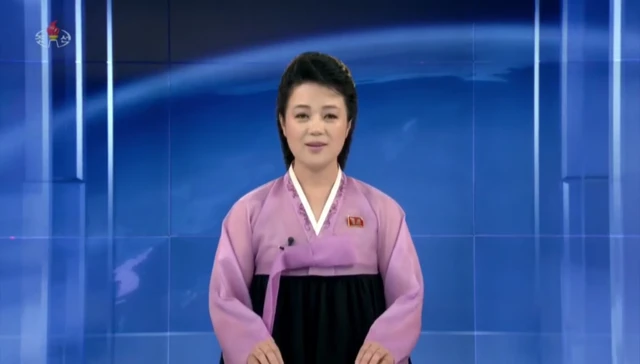 Image source, North Korea TV
Image source, North Korea TVTelevision viewers in North Korea are still in the dark over the outcome of Friday's summit.
While they were made aware that their leader had travelled to Panmunjom for the event through an earlier press review, neither the early evening nor late evening main news mentioned the events on the border.
In fact, the lead story in the main news was about former leader Kim Il-sung’s birthday being noted in Russian newspapers. The late Mr Kim’s birthday is marked on 15 April as a national holiday in North Korea called the Day of the Sun.
News does not always live up to its name in North Korea. The media have a long record of not informing the people of important events until at least the day after they have happened, and the prospect of peace in the region is no different, it seems.
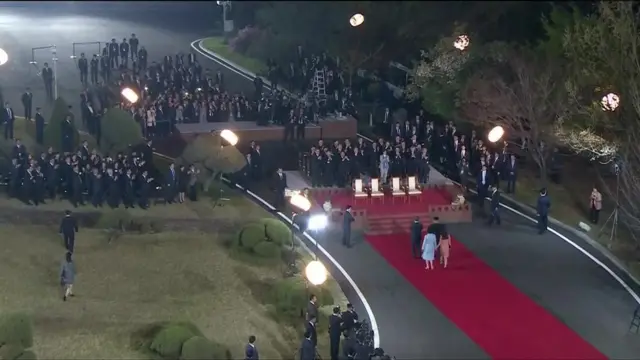 Image source, Reuters
Image source, ReutersMr Moon and Mr Kim have emerged from the Peace House after dinner, to applause and upbeat music.
As they took their seats facing the building, the lights dimmed and a light show began on the exterior, accompanied by another musical performance.
Why did Mr Kim travel to South Korea, rather than the other way around?
What were the security arrangements North Korea made for its leader?
And did a military salute constitute an awkward moment?
On Pyongyang’s nuclear tests
During a televised briefing
Mr Kim: “I heard you [President Moon] had your early morning sleep disturbed many times to attend National Security Council meetings. I will make sure that your morning sleep won’t be disturbed.”
On North Korea’s traffic problems
Mr Kim to Mr Moon in a live broadcast
Mr Kim: “I’m worried that our transport situation is bad so it may discomfort you, it may be embarrassing [for me] if you visit North Korea after living in the South’s environment”.
On visiting South Korea’s presidential Blue House
According to a South Korean spokesperson
Mr Moon: “I can show you scenes far better than this if you come to the Blue House”.
Mr Kim: “Really? I will go to the Blue House any time you invite me.”
On visiting North Korea
According to a South Korean spokesperson
Mr Moon: “While you come to the South, when can I possibly go over there [to North Korea]?”
Mr Kim: “Why don’t we just cross over now?”
(Mr Moon, in an unscripted moment, stepped over the line into North Korean territory)
Allow X content?
This article contains content provided by X. We ask for your permission before anything is loaded, as they may be using cookies and other technologies. You may want to read X’s cookie policy, external and privacy policy, external before accepting. To view this content choose ‘accept and continue’.
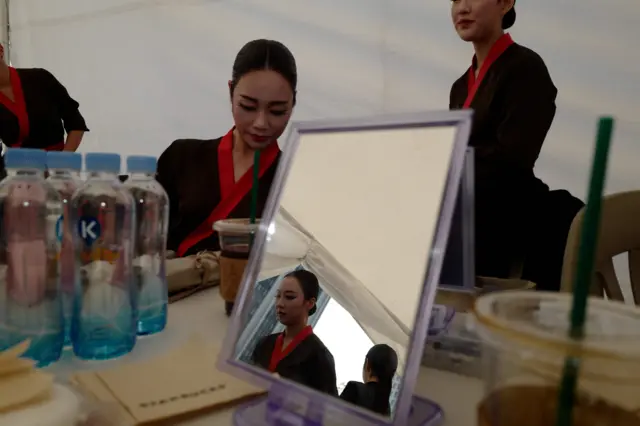 Image source, AFP
Image source, AFPEarlier, performers prepared to take part in a mass Buddhist prayer ceremony in support of the talks
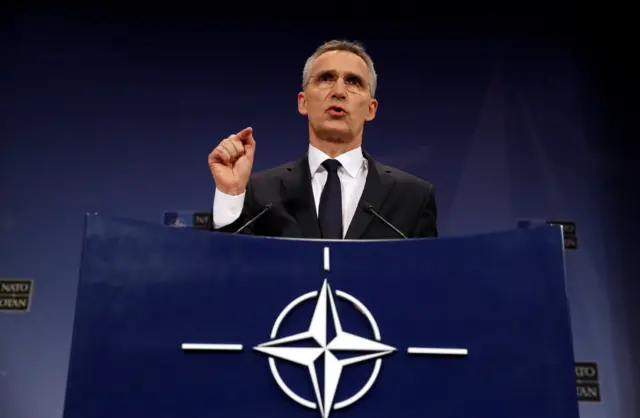 Image source, Reuters
Image source, ReutersSpeaking in Brussels, Nato Secretary General Jens Stoltenberg said there was still much to be done:
"I welcome that we have seen progress and that we have seen that the two leaders have been able to meet.
"This is a first step, it's encouraging and then we have to realise that it's still a lot of hard work that lies ahead of us."
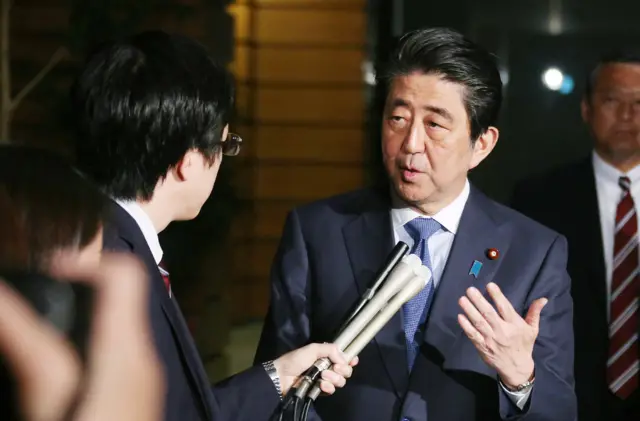 Image source, Getty Images
Image source, Getty ImagesJapan, which has been threatened by North Korean missiles, said the summit was a positive step.
Prime Minister Shinzo Abe welcomed the "serious discussions", calling them "a forward-moving and comprehensive step towards the resolution of the various North Korean problems".
"We strongly anticipate that North Korea will take concrete steps following this summit and the one with the US later on, and we will be monitoring North Korea's movements hereafter," he said.
A number of websites have transcribed the English version of today's statement, including South Korean news agency Yonhap.
The foreign ministry in Moscow says the country is ready to facilitate practical co-operation , externalbetween North and South Korea over rail links, and gas and power supplies.
Connecting roads and railways between the two countries features in the summit statement.
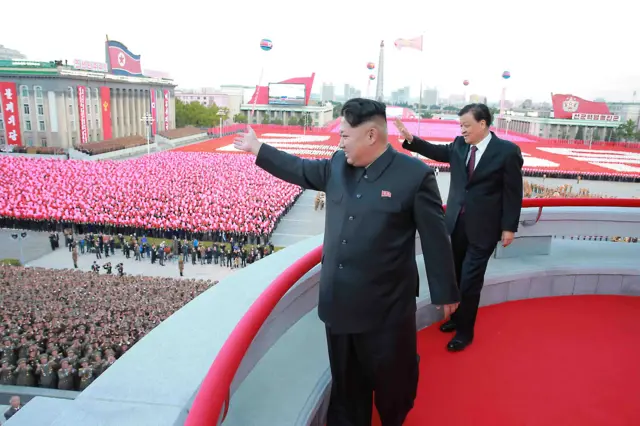 Image source, EPA
Image source, EPAA military parade in Pyongyang
As the leaders mix at their banquet, it's worth remembering the huge contrast between the states they lead.
Decades of rigid state control have led to economic stagnation and a personality cult in the North, which stands accused of systematic human rights abuses. Famines and hardship are covered up by the state media which pump out propaganda about Mr Kim.
South Korea has developed into one of Asia's most affluent countries, a leading exporter of cars and electronic goods. After early decades marked by authoritarian rule, it is today a fully fledged democracy but one dogged by corruption scandals.
Video feeds from the formal banquet show that the assembled dignitaries were treated to some traditional music and the children's songs before dinner.
Judging by the images, it all went down well with Mr Kim and his wife.
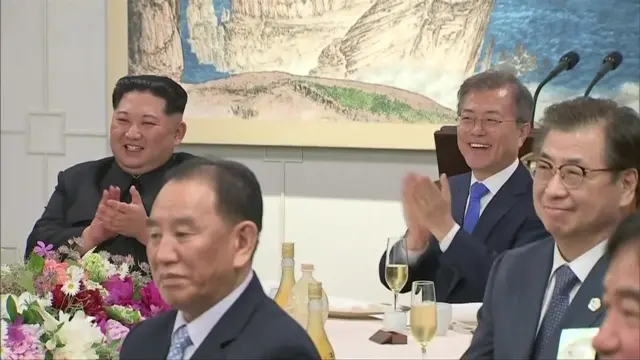 Image source, Reuters
Image source, Reuters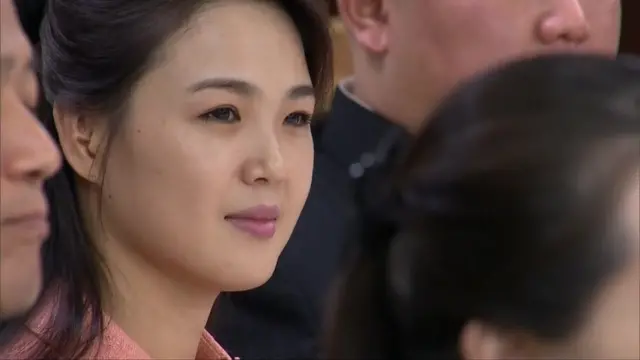 Image source, Reuters
Image source, ReutersAllow X content?
This article contains content provided by X. We ask for your permission before anything is loaded, as they may be using cookies and other technologies. You may want to read X’s cookie policy, external and privacy policy, external before accepting. To view this content choose ‘accept and continue’.
Allow X content?
This article contains content provided by X. We ask for your permission before anything is loaded, as they may be using cookies and other technologies. You may want to read X’s cookie policy, external and privacy policy, external before accepting. To view this content choose ‘accept and continue’.